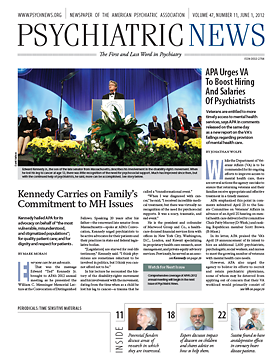While the Department of Veterans Affairs (VA) is to be commended for its ongoing efforts to improve access to mental health care, there are several actions the agency can take to ensure that returning veterans and their families receive appropriate and effective treatment in a timely manner.
APA emphasized this point in comments submitted April 23 to the Senate Committee on Veterans’ Affairs in advance of an April 25 hearing on mental health care delivery led by committee Chair Patty Murray (D-Wash.) and ranking Republican member Scott Brown (R-Mass.)
In its letter, APA praised the VA’s April 19 announcement of its intent to hire an additional 1,600 psychiatrists, psychologists, social workers, and nurses to meet the growing number of veterans with mental health care needs.
However, APA also urged the agency to bolster its efforts to recruit and retain psychiatric physicians, some of whom may be deterred from applying out of concern that their VA workload would primarily consist of writing prescriptions and reviewing disability paperwork rather than providing treatment.
“[D]espite the high number of veterans treated with medications, there has been virtually no training for VA mental health staff on evidence-based pharmacotherapy… [or] on using a combined approach that involves both psychotherapy and pharmacotherapy,” wrote APA Medical Director James H. Scully Jr., M.D.
According to Scully, the VA spends between $10 million and $20 million each year on evidence-based psychotherapy (EBP) training, but only 5 percent to 10 percent of the clinicians receiving that training are psychiatrists.
“The emphasis on EBP and EBP training, while valuable, is a mono-dimensional approach that ignores the complex mental health care needs of veterans,” Scully said.
APA also called on the VA to incentivize the participation of psychiatric physicians by offering starting salaries commensurate with those of psychiatrists in both the public and private sectors; ensuring that agency-affiliated human-resource departments prioritize the hiring of psychiatrists and quickly process new hires; and increasing the development of residency-training and loan-forgiveness programs.
Other APA recommendations centered on providing mental health services to veterans wherever they may live. This could be achieved, said Scully, through the employment of psychiatrists working in rural areas, an expansion of telepsychiatry options, and the increased engagement and training of existing community psychiatrists and primary care physicians.
Concern about veterans’ access to mental health care was also the impetus for an April 25 report written by the VA’s Office of Inspector General (OIG) at the request of the House and Senate committees on Veterans’ Affairs and VA Secretary Eric Shinseki.
The OIG’s 63-page report revealed that only 49 percent of veterans seeking mental health care for the first time were seen within 14 days, as opposed to the 95 percent reported earlier by the Veterans Health Administration (VHA). The remaining first-time patients waited an average of 50 days for a comprehensive mental health evaluation.
The OIG also noted that despite the VHA’s reported 39 percent increase in mental health clinicians from 2005 to 2010, 71 percent of clinicians responding to a 2011 VA survey said “their medical center did not have adequate numbers of mental health staff.”
Among the report’s recommendations are that the VHA develop a more accurate method for measuring how long veterans wait for appointments and that it conduct a comprehensive staffing analysis.

